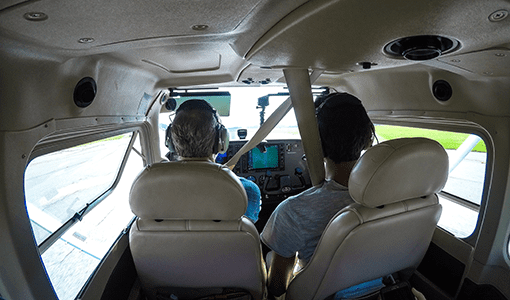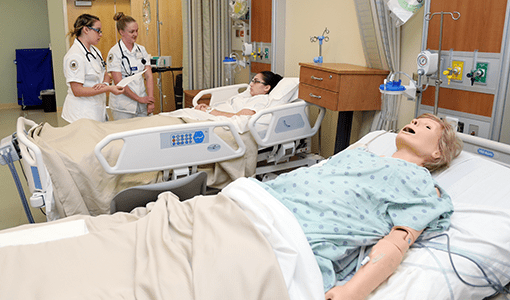
Signature NC Promise Programs Revitalize Local Economies
Aron Bechiom has seen the world, but nothing excites him more than gazing down at his home town, Elizabeth City.
In the Navy, Bechiom logged plenty of adventurous hours overseas. Now, after returning home and nearing completion of his bachelor’s degree in aviation science at Elizabeth City State University, he is ready to embark on an ambitious new mission: to start his own business flying unmanned aircraft systems (UAS, or drones). Just recently, Elizabeth City Parks and Recreation requested the ECSU aviation program to survey a newly constructed boardwalk, which runs alongside the Pasquotank River. Bechiom was assigned for this task.
As he guided the drone and its camera up and down the rippling waterway, Bechiom no doubt looked at his hometown from an exciting new perspective. He had, after all, just soft-launched his future.
Following years of service to his country, he is bringing his expertise and his entrepreneurial spirit home. He will help amateur enthusiasts and budding filmmakers learn how to shoot their own drone footage. He will help local developers survey the area’s tricky terrain. He will be helping engineers to inspect infrastructure and farmers to inventory their crops.
Bechiom embodies the UNC System’s ambition to improve economic mobility for more North Carolinians, as outlined in Higher Expectations: Strategic Plan for the University of North Carolina, 2017-2022.
Some might casually expect Bechiom to use his degree as a ticket to a more exciting life in Raleigh, Charlotte, or Atlanta. Instead, he is —like many other graduates of the UNC System—investing his talent at home and growing the local economy. With Precision Flight UAS, he will be going places, even while his feet remain firmly planted in Elizabeth City.

Economic Mobility: Brain Sustain, Not Brain Drain
The UNC System has dedicated itself to making college education more affordable. Its efforts will ensure that every North Carolinian has access to a college education and the economic mobility and personal rewards one can bring.
Recent studies have shown that a college graduate will earn, over the course of a lifetime, one million more dollars, on average, than a peer with only a high school degree. In today’s rapidly changing economy, higher education is simply no longer a luxury.
The NC Promise Tuition Plan, for example, sets undergraduate in-state tuition at just $500 per semester and out-of-state tuition at just $2,500 per semester at three UNC System universities: Elizabeth City State University, UNC Pembroke, and Western Carolina University.
These three campuses are geographically diverse and located across the state. Every North Carolinian lives within 150 miles of an NC Promise university, making it easy for residents in all 100 counties to pursue higher education. A UNC System degree is both affordable and convenient.

But the words “economic mobility” stir up anxiety in underserved communities, where some equate the phrase with “brain drain.” They fear that better job prospects elsewhere will lure those with college degrees away, depleting already stressed communities of their best and brightest.
But statistics suggest otherwise. In many cases, students remain committed to (and employed in) the region where they are educated.
More than that, signature programs at each NC Promise institution demonstrate how curricula can be designed to capitalize on regional needs, resources, and unique opportunities. A degree in hand doesn’t equate with a ticket to elsewhere. Instead, it prepares students to thrive in the local economy.
“Education doesn’t divide communities. It makes communities stronger,” said UNC System Interim President William L. Roper. “As students learn, they develop stronger bonds with the people and the institutions around them. When our students graduate, they are prepared for success, and many are eager to find that success in the communities they already call home.”
…curricula can be designed to capitalize on regional needs, resources, and unique opportunities.
Health and the Healthy Economy
UNC Pembroke’s nursing program—housed in the university’s recently established College of Health Sciences – offers a salient example of how investment in UNC System students doesn’t just benefit those individuals who graduate. These investments ultimately contribute to the overall health of local economies.
The nine-county service area for UNC Pembroke is among North Carolina’s most rural, ethnically diverse, and financially distressed regions. In Robeson County alone, 83.8 percent of K-12 students qualify for free or reduced school lunch. Over twenty eight percent of the region’s residents live beneath the poverty line, a staggeringly high number compared to the Triangle’s 13.6 percent.
These factors create unique health care challenges, which are compounded by the fact that the region’s health care workforce lacks the size and diversity needed to adequately address regional need. Year after year, the Robert Wood Johnson Foundation ranks Robeson County 100 out of 100 in health outcomes, with five other counties in the university’s service area ranked in the bottom 25.

The push to establish the College of Health Sciences was motivated in large part by UNC Pembroke’s and the UNC System’s commitment to addressing the state’s most pressing health care needs.
The region’s unique challenges provide research opportunities for faculty interested in studying and teaching about social determinants of health. For example, in fall 2018, four faculty members in different disciplines—American Indian Studies, Biology, and Nursing—worked together to coordinate classes that shared an emphasis on indigenous food traditions, community health, and the genetic impacts of nutrition. Looking at health through this multidisciplinary lens, the classes focused specifically on how these issues affect Robeson County’s American Indian community and UNCP students. The ideas generated through this teaching practice were in turn disseminated throughout the community, as other faculty joined to help integrate the concepts into clinical practice and client/community care interventions.
The region’s complex health needs also provide nursing students with ample opportunities for immersive learning experiences. The university has established working relationships with over 100 community partners, which assist in the clinical supervision and internship elements of various existing academic programs. In many cases, UNC Pembroke graduates in nursing, social work, counseling, or athletic training begin their careers by working as students with these partners.
70% of nursing program graduates will continue working in the area, revitalizing the region’s health care service and its economy.
“One of the things that’s very important about the nursing program, the College of Health Sciences, and UNCP in general is how much time is devoted to service learning and regionally focused community engagement,” said Dr. Angela McDonald, interim dean of UNC Pembroke’s College of Health Sciences. “Faculty are committed to serving the region through teaching, research, and service. They are always asking ‘What are the needs of the region? How do we bring these needs into the classroom? How can we get students into the community doing hands on projects that address health from a very broad perspective?’”
Beyond the immediate health benefits of the university’s support of free or reduced-cost clinics and health assessment services, the region will also see long term gains as the number of skilled professionals in the community grows.
According to recent statistics, Robeson county has suffered from net out-migration as textiles and manufacturing operations in the region have shuttered. The North Carolina Association of County Commissioners predicts a 1.4 percent population loss in Robeson County between 2015 and 2022. Highly qualified and uniquely skilled professionals are the backbone of a revitalized modern economy, yet in Robeson County only 12.4 percent of residents have a bachelor’s degree or higher. Only 13.7 percent of residents in four adjacent counties (Scotland, Hoke, Richmond, Bladen) do.
UNC Pembroke is thus a powerful regional resource, offering residents in this underserved region the opportunity to find their way into promising, well-paying careers. Most of UNC Pembroke’s students come from the university’s service area: 21 percent from Robeson County alone, and 56% from the surrounding counties. Sixty-two percent of these students receive Pell Grants.
A recent study of the university’s economic impact, published by the UNC System Office in 2015, suggests that UNC Pembroke provided nearly $390 million in additional state income. In effect, that’s the equivalent of creating over 6,200 new jobs.
Crucially, this economic growth is mostly felt in the university’s service region. Many of the students who graduate from UNC Pembroke won’t take their talents elsewhere after they graduate. To date, 17,000 alumni have remained in the university’s service region, keeping their skills—and their increased expendable income—at home.
Statistically, 70% of nursing program graduates will continue working in the area, revitalizing the region’s health care service and its economy.
Of course, nursing isn’t the only program offered in UNC Pembroke’s College of Health Sciences. Students can also earn degrees in social work, counseling, athletic training, and exercise science. The college’s long term vision includes a plan to establish an occupational therapy program, along with doctoral programs in physical therapy and nursing.
Taken as a whole, UNC Pembroke’s College of Health Sciences is producing a workforce with a wide-ranging skillset. Given that the university’s student body is the most diverse in the UNC System and the second most diverse among Southern regional universities, each graduating class will bring more diversity to the health care workforce. Eventually, the region’s health care providers will reflect the regional demography. When providers and patients share similar backgrounds, health care outcomes improve.
In short, UNC Pembroke’s investment in its nursing program and in expanding its College of Health Sciences more generally pays off dividends. Its students earn qualification to work in well-paying health care fields. Residents have access to a highly skilled, diverse health care workforce. And the region’s vital economic statistics will grow stronger.
Down the Path Toward Greener Pastures: Leading the Way to Tomorrow’s Economy
The infrastructure for one of the United States’ most lucrative industries isn’t just in Western Carolina University’s back yard. It is WCU’s back yard!
Outdoor recreation is a major force in the U.S. economy, annually generating $373 billion—that’s over two percent of the nation’s gross domestic product. This year, 56 percent of North Carolinians will pursue an outdoor activity. Hiking, camping, fly fishing, kayaking, mountain biking … all of these and other similar activities require participants to invest in accommodations, lodging, and gear. In 2019, consumers will spend nearly $5 billion on outdoor recreation in North Carolina.
Nestled in the mountains and surrounded by public lands, WCU is perfectly situated to help develop the workforce western North Carolina needs to support this lucrative and growing industry. In addition to established majors such as recreational therapy and hospitality and tourism, several new certificate programs are set to launch by the end of the year, including outdoor business management, gear design, and gear manufacturing.
The diversity of programs and initiatives at WCU related to the outdoor recreation industry reflects the wide range of professional opportunities available in the outdoor recreation economy. Work in the industry isn’t limited to guiding hikes and rafting trips. The outdoor economy is diverse, requiring a host of ancillary goods and services.
WCU is already positioned to generate the requisite workforce. Its graduates have expertise in hospitality, management, environmental preservation, design, manufacturing, and other skills essential to the outdoor recreation industry.
Last year at WCU’s Center for the Study of Free Enterprise, the fourth annual Student Pitch competition gave budding entrepreneurs the opportunity to present their business ideas related to the outdoor economy. Top entries included redesigned backpacks, a business plan for a mobile outdoor store, safety lights for snowboards, and an innovative power-source design for bicycle lights. Mechanical engineering major Kyle Monaghan’s winning entry envisioned a trekking pole that turns the user’s movement into stored electrical energy. A senior capstone team in WCU’s College of Engineering and Technology is currently working on a second innovative new trekking pole handle, which will soon be submitted for patent consideration.
Though these plans are still in their infancy, past history predicts success for outdoor gear designs conceived at WCU. While studying at WCU, Nick Provost and Peter Moyle conceived of a business plan for low-cost, highly durable adventure sunglasses. Today, this homespun plan has come to fruition: the shade purveyor Gnarcissist now distributes in several states far and wide, including Idaho, Colorado, and Wyoming. Despite their national success, Provost and Moyle have stayed at home: Gnarcissist is still based in Asheville.
“We aren’t training our students to go out to the Pacific Northwest,” said Andy Coburn, associate director of WCU’s Program for the Study of Developed Shorelines, and one of two Outdoor Industry Faculty Liaisons. “We are working with partners to identify what the workforce needs are here, so we can get our students prepared, ready, and able to go into positions to help build western North Carolina’s economy in a sustainable way.”

The outdoor recreation industry is growing rapidly. In 2016, the Bureau of Economic Analysis found that this economy grew faster than the overall U.S. economy. Its gross output, wages, and employment all outpaced the overall economy’s. But as global warming changes this industry’s infrastructure and as consumer preferences evolve, this unique economy will have to adapt accordingly. In short, jobs in the thriving outdoor economy will both proliferate and evolve.
WCU officials are working closely with regional business leaders and experts to help anticipate what the landscape of the outdoor recreation industry will look like in the coming decades.
“At Western Carolina University, we embrace our role of being a catalyst for positive change for the Western North Carolina region that we were founded to serve. As our region moves forward, we continue to be a leader in and convener of the conversations around economic development,” said Alison Morrison-Shetlar, Western Carolina University interim chancellor. “Given WCU’s record of being named the top outdoor adventure college in the Southeast and Mid-Atlantic by Blue Ridge Outdoors magazine for four consecutive years, it makes perfect sense for the institution to prepare students for careers in the burgeoning outdoor recreation industry. These careers will allow many of our graduates to remain in this region, becoming successful members of the community and significant contributors to our regional economy.”
In October, 2018, the university hosted its first annual Outdoor Economy Conference, bringing together manufacturers, county and state-level economic developers, non-profit organizations, business leaders, and other experts to discuss the future: How can the region grow its outdoor recreation economy? What steps can be taken to ensure that it grows in a sustainable way? What new trends will develop in the industry? How will workforce needs evolve? What role does the university play in finding solutions to these challenges? The event was so successful that organizers are already planning to host the 2019 conference in Asheville in order to accommodate the anticipated surge in participants.
In addition, WCU has also collaborated with a non-profit community development organization, MountainBizWorks, and several other partners to secure a $940,000 Appalachian Regional Commission grant to boost western North Carolina’s outdoor recreation industry. Over the next five years, the collaborators expect to attract 35 new outdoor businesses and to expand 100 existing ones, to train 125 students in new outdoor programs, to create at least 150 new jobs, and to generate $10 million in new business investment.
“We aren’t just preparing students for what’s available now,” said Andy Coburn. “We are working with partners so we can prepare for what the industry will look like in 5, 10, 15 years.”
New Opportunities Take Flight
North Carolina is famously “first in flight,” and ECSU is doing its part to keep the state’s reputation as a pioneer in aviation aloft.
Aviation is a major driver of North Carolina’s economy. The state has 72 publicly owned airports. Charlotte is a major hub and one of the world’s busiest airports. FedEx has a major distribution hub in the state.
All told, aviation brings $52 million dollars, 307,000 jobs, and $12.6 billion in personal income to North Carolina’s economy, according to the NC Department of Transportation’s Division of Aviation.
Moving 62 million passengers and 850,000 tons of cargo every year requires a robust workforce. As the state’s only aviation science program offering a bachelor’s degree, ECSU plays a key role providing the industry with the skilled talent it needs.

A career in aviation doesn’t necessarily mean piloting planes. ECSU’s program prepares students to work in flight education, air traffic control, aviation management, UAS, and aviation electronics (avionics).
As an NC Promise institution, ECSU can offer a premier education in aviation at roughly half the cost of what students would pay elsewhere. No surprise then that ECSU is a regional university with a powerful statewide impact. The program attracts roughly 60 percent of its students from counties beyond the university’s service region. Eighteen percent come from out of state.
But nearly a quarter of its students come from within ECSU’s 21-county service region. The aviation program is clearly playing a vital role supplying northeastern North Carolina with a skilled workforce. Elizabeth City is home to a regional airport, the largest U.S. Coast Guard air station in the country, and several aviation companies.
The university’s highly anticipated bachelor’s degree program in drone technology, slated to launch in fall 2019, will further enhance the program’s capacity to lift northeastern North Carolina’s economy.
Public perception of drones’ usefulness tends to be limited. People casually assume that they are either novelty gizmos or high tech combat machines. In fact, they are highly versatile tools, with over 300 key applications, including media and entertainment, asset inventory, insurance, surveillance, transportation, and infrastructure inspection.
“Flying is only one part of it,” said Dr. Kuldeep Rawat, dean of Science, Math, and Technology and director of the Aviation Science Program. “A drone is an aerial data collection platform. Information is what people are paying for.”
And people are paying a lot for information these days. For example, Price Waterhouse Cooper anticipates that using drones to inspect, inventory, and repair infrastructure is on its way to becoming a $45 billion industry. This application is particularly valuable in northeast North Carolina, where solar and wind farms cloak the landscape. ECSU’s highly skilled graduates will no doubt help monitor these assets, which are spread across the terrain and could someday even be located offshore.
Similarly, drone technology will increasingly support the region’s agriculture industry. A decade ago, farmers working a 300 acre plot of land might log countless hours a year walking or driving the fields just to survey crops. Today a drone can keep tabs. Agriculture monitoring is becoming a $32 billion industry as farmers grow to rely on these airborne data collection devices to determine which plots need pest control and which need a few extra drops of water.
Students who graduate from ECSU’s UAS program won’t just know how to operate remotely-piloted vehicles. They’ll also be trained to operate sophisticated data monitoring equipment and to interpret, analyze, and present the valuable information they collect.
“Data is the new oil,” Aron Bechiom said, “That’s what ECSU’s UAS program understands. Whether we’re talking about information or imagery, it’s all about data.”
Bechiom’s intuitive comment succinctly articulates ECSU’s commitment to readying students for success in the new information economy.
The Wealth of Information
This work to make North Carolina’s communities more resilient takes place at every institution in the UNC System. As signature programs at three NC Promise institutions epitomize, the UNC System is creating the talent that will help communities revitalize themselves. From the mountains to the sandhills to the coast, North Carolinians are studying how to take on the future.